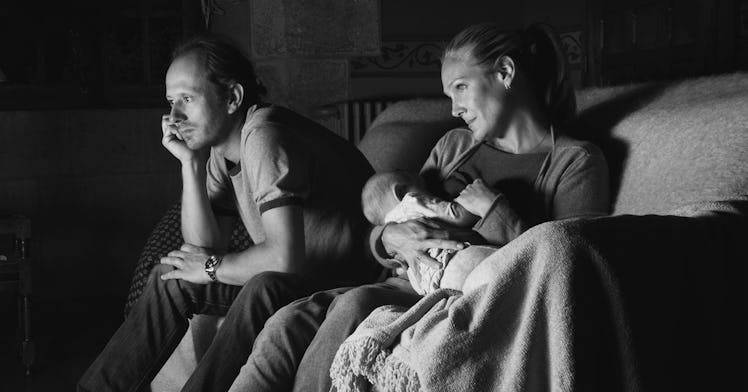Breastfeeding Is Great for Babies. But Is It Bad For Dads?
For many new dads, breastfeeding is little more than a lonely time apart from his baby.

When Harvinder Sihota was expecting a child, she and her husband consulted a care provider to learn about breastfeeding. After the consultation, Sihota says, her husband wondered why he had even gone to the appointment — after all, they had barely made eye contact with him and all attention and advice were directed to mom. This made Sihota, who is a nurse practitioner, curious about other fathers’ experiences of feeling left out, through no fault of their own. After all, a dad is often told to “be supportive” while mom is breastfeeding and given little agency or advice on how to do that. She wondered, what is that experience like for most men?
Sihota’s curiosity eventually lead to a research review on the subject with her colleagues at the University of British Columbia, which was published last year. The study added to a small but growing body of research focusing on the father’s perspective, which is often an overlooked aspect of breastfeeding. Researchers agree that breastfeeding is good for babies and moms. Breastmilk likely protects babies from infections, makes them less likely to become overweight, and the bacteria in breastmilk builds the foundation of an infants’ gut microbiome — the ecosystem of microbes inside the digestive system that can help keep a person healthy throughout their life. Nursing has even been found to potentially protect mothers from some cancers and type 2 diabetes.
Babies win. Moms win. But dads? Sihota’s research found that they struggled.
Many mothers feel they bond with their infants during their nine months of pregnancy in ways that dads just physically can’t. “What breastfeeding meant for a lot of dads was almost an extension of this exclusivity,” Sihota says — one that hinders their own chance to bond with their baby.
Difficulty during breastfeeding, like an infant who won’t latch, can lead to even more troubles for dads. In conducting research on this subject, Francine deMontigny, a professor of nursing at the University of Quebec, found that breastfeeding problems can trickle into a marriage. Fathers are often left feeling helpless and inadequate. These insecurities, combined with the time and bodily commitments placed on their breastfeeding partners, can strain their relationships, and dad’s mental health.
Feelings of inadequacy and relationship problems can exacerbate paternal postpartum depression, which afflicts more than ten percent of fathers, according to a large analysis. Another study found that the fathers of breastfed children had a lower quality of life than the fathers of bottle-fed children.
These problems are serious, Sihota says, but they don’t warrant giving up breastfeeding and picking up the bottle. For one thing, fathers’ experiences aren’t easy to pin down and there are ample studies showing breastfeeding in fact had a positive impact on dad’s life. In one study, Pakistani fathers said they felt breastfeeding brought them closer to their partners. Fathers in a different study easily found their role supporting the mother and infant during breastfeeding.
The difference between these two groups is perhaps one of finding motivation and purpose for dads. Even though mothers typically carry out the feeding, there are plenty of ways fathers can get involved and find their role in breastfeeding. They can pick up the household slack by taking charge of older children or chores, for example. Bringing a nursing mother water or the remote are small ways dads can support and make the mother comfortable while she nurses. Dads can read up about breastfeeding so that they are prepared to help troubleshoot when problems arise. There are psychological benefits to these chores: In one study, deMontigny found that fathers who took on these sorts of tasks adapted more easily to breastfeeding and felt more competent.
But of course, bonding with baby is the big hole that dads with breastfeeding partners are trying to fill — and finding those opportunities is crucial. Fortunately, baby’s needs extend far beyond breastfeeding and dads can take on more of the other tasks, like burping and changing diapers, calming down at night, and, if moms are pumping, offering a bottle to give mom some space. Being close to baby, after all, isn’t just a psychological boost — it is part of the physiological transformation (dropping testosterone, a rise in oxytocin) that can set dads up for long-term success as a parent.
Moms might help by stepping away more often to give fathers and infants alone time, deMonitigny said. Many of the men in her research were surrounded by women — their partners, mothers, and mothers-in-law — who told them how to pick up, hold, and interact with their babies. In response, some fathers withdrew. Giving dads the space to parent in their own way can give them a chance to bond, and it can be good for the baby. “The research has found that dads interact differently with a child, and that’s okay because it brings a different kind of stimulation, interaction, and information to the child, and the child benefits,” deMontigny said.
With little research and few resources to help new fathers during breastfeeding, there’s only so much families can do alone. “I think the responsibility is placed on the healthcare provider,” Sihota says, “When the mom and the dad are here and we are engaging in a conversation about infant nutrition, breastfeeding, bottle-feeding, et cetera, [we need to ask] how can we include dad?” That doesn’t mean dad can’t raise his hand and ask the same question.
This article was originally published on